
Cardiff Rugby Football Club is a rugby union club based in Cardiff, the capital city of Wales. The club was founded in 1876 and played their first few matches at Sophia Gardens, shortly after which relocating to Cardiff Arms Park where they have been based ever since.

St Helen's Rugby and Cricket Ground, commonly known simply as St Helens Ground, is a sports venue in Swansea, Wales, owned and operated by the City and County of Swansea Council. Used mainly for rugby union and cricket, it has been the home ground of Swansea RFC and Swansea Cricket Club since it opened in 1873.

Jack Bancroft, born John Bancroft, was a Welsh cricketer, and rugby union international. He was a right-handed batsman and a wicket-keeper who played for Glamorgan. Bancroft also played rugby for Swansea RFC. He was born and died in Swansea.

William O'Neill, often recorded as Billy O'Neil or Billy Neil, was a Welsh dual-code international rugby union and rugby league front row player who played club level rugby union (RU) for Cardiff and Aberavon, and as a professional rugby league footballer he represented Warrington. O'Neill was capped eleven times for the Wales rugby union national team, and twice for the Wales national league team. Although playing throughout the 1904/1905 season, he missed the classic 1905 Wales win over the Original All Blacks. He is often registered in many sources under the name Billy Neill or Neil because the Welsh Rugby Union didn't want him to sound like he was Irish.

William James Trew, better known as Billy Trew was a Welsh international centre, outside half and wing who played club rugby for Swansea Rugby Football Club. He won 29 caps for Wales and is seen as one of the key players of the first Golden Age of Welsh rugby union

Dicky Owen was a Welsh international scrum-half who played club rugby for Swansea RFC Owen is seen as one of the greatest Welsh scrum-halves and won 35 caps for Wales between 1901 and 1912, a record that was unbeaten until 1955 when Ken Jones surpassed him.
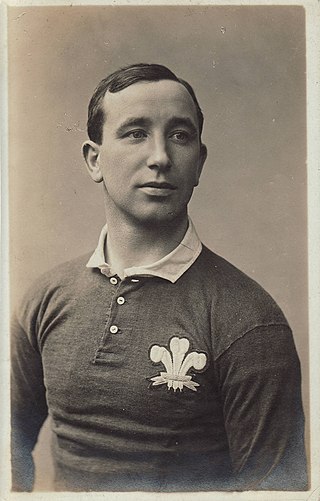
Richard Hughes Jones was a Welsh international fly-half who played club rugby for Swansea Rugby Club. He won 15 caps for Wales and played county rugby for Glamorgan.

William Gwynn was a Welsh international rugby union forward who played club rugby for Swansea and would later become secretary of the Welsh Rugby Union. Gwynn was an all-round sportsman and as well as his success on the rugby pitch he also player cricket for Swansea, of which he became vice-president, and Glamorgan. Gwynn had also played association football and had captained Battersea College XI through two undefeated seasons. He would later become a referee and would officiate the very first football game between Swansea Town and Cardiff City.

Ivor Morgan was a Welsh international rugby union forward who played club rugby for Swansea and county rugby for Glamorgan.

George Hayward was a Welsh international rugby union forward who played club rugby for Swansea, and was capped for Wales on five occasions and was part of the 1908 Home Nations Championship winning team.
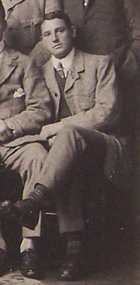
Phillip Dudley Waller was an English-born international rugby union forward who played club rugby for Newport and Johannesburg. He won six caps for Wales and also played for the British Isles in their 1910 tour of South Africa.
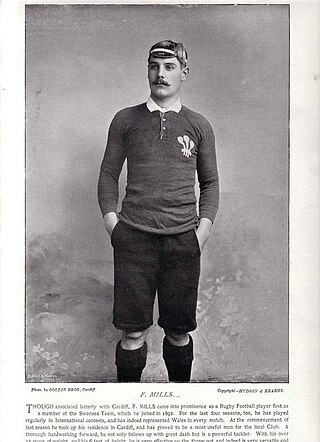
Frank Matthew Mills was a Welsh rugby union forward who played club rugby for Cardiff and Swansea and won 13 caps for Wales. He is best remembered as being one of the Wales squad that won the Triple Crown for the first time in 1893.
David John Thomas was a Welsh international forward who played club rugby for Swansea Rugby Club. He won ten caps for Wales and is most notable for scoring the only try in Swansea's win over South Africa in 1912.
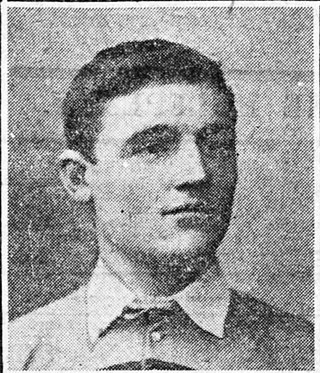
Edwin Thomas Maynard known as Edwin Thomas or "Beddoe" Thomas was a Welsh international rugby union prop who played club rugby for Newport RFC. Thomas was part of the Wales team that won the Triple Crown in 1909, and faced all three major Southern Hemisphere teams; New Zealand, South Africa and Australia, for Newport.
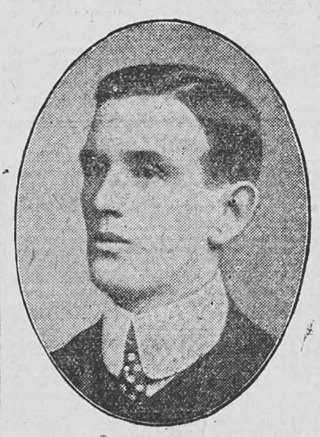
Lieutenant Hopkin "Hop" Thomas Maddock MC was a Welsh international rugby union wing who played club rugby for Pontycymer and London Welsh and county rugby for both Glamorgan and Middlesex. Maddock played in six international rugby games for Wales scoring a total of six tries. A pacey and elusive runner, Maddock set several scoring records at London Welsh, and scored 170 tries during his career with the club.
David "Dai" Westacott was a Welsh international rugby union forward who played club rugby for Cardiff. Westacott played a single international game for Wales 8n as part of the Glamorgan county team in 1905.
Glamorgan County RFC is a Welsh rugby union club that manages an invitational team, known as Glamorgan that originally played rugby at county level. The team is made up of amateur players from sports clubs in the Glamorgan region and historically played matches against other county teams from Wales and England, and during the 20th century was a key fixture for touring international teams. Today the club manages Glamorgan's premier rugby union tournament, the Glamorgan County Silver Ball Trophy, and arranges invitational Glamorgan teams to face Welsh rugby clubs during celebrations, such as anniversaries.
Thomas Henry Evans was a Welsh international rugby union flanker who played club rugby for Llanelli. Evans played in eighteen international games for Wales, and in 1908 was part of the Welsh team that faced touring Australian team. Evans played in four Home Nations Championships, from 1906 to 1909, and the first two Five Nations Championships, in 1910 and 1911; playing in three Triple Crown winning seasons.
John Charles Meredith Dyke was a former Wales international rugby union fullback. Dyke made his debut for Wales on 1 December 1906 versus South Africa and was selected for the 1908 British Lions tour to New Zealand and Australia. He played club rugby for Penarth and London Welsh.

John "Jack" Alf Brown, colloquially known as John Alf or "Big John", was a Welsh international rugby union forward player who played club rugby for Cardiff and county rugby for Glamorgan. Brown was capped seven times for Wales and although he missed facing the first touring South African team in 1906 with Wales, he faced the tourist with both Cardiff and Glamorgan.















